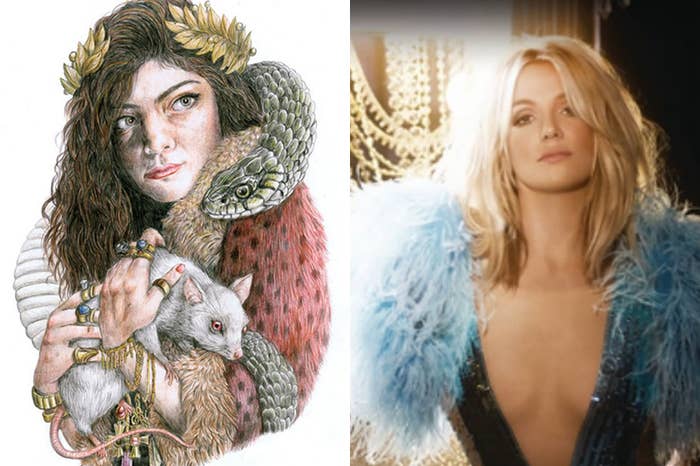
Certain pop stars seem to pop out of nowhere. These kids were, the "story" goes, immaculately conceived and birthed on the Billboard charts. Of course, nearly every narrative of overnight success is a false one that is in essence an erasure of someone's actual history—the work they did to get to number one. Ke$ha's first words were not, "wake up in the morning feeling like Pee Diddy." They weren't even, "you spin my head right round." She was, in fact, bombarded with the sound of her own voice inside Flo Rida's through the speakers of the dollar store where she'd been shopping for canned tomatoes. But even when the public is able to fit a pre-glossy picture of a pop singer into their collective consciousness, it often is folded into the classical reduction of that singer from a person to a persona. Jewel—whose debut album was released two years before it finally took off—was one girl witty enough to, in her biography, call out the caricature that had been built of her for what it was: "It's all become a cartoon—'GIRL RAISED BY WOLVES IN ALASKAN MUD HUT MOVES INTO CAR, ROCKETS OVERNIGHT TO FREAKISH STAR STATUS!'"

But the unwillingness or inability of the most mainstream audiences to wrap their minds around someone's complex history does more harm than just causing low self-esteem in that someone; it can prevent any important message that they might want to relay to kids from being taken seriously. When the fact that a superstar was ever a normal person is conveniently effaced, the true lifestyles of the normal people who go to their shows are buried under gloss. This destructive cycle hits its sub-basement when Top 40 music is so saturated with fantasies of glamour that the people making it become utterly disconnected from the people buying it. And just like that, the audience is forced to sit and listen to breathy boasts about private boats, waiting for someone to speak for them.

That's how we ended up with "Work Bitch," which, regardless of its quality as a tune, is the epitome of lux pop, which has dominated airwaves for the last few forevers. How appropriate that it debuts at a moment in which an anti-affluence anthem is, as of this writing, sitting at the top of the charts. That song is "Royals," and while Lorde isn't unique amongst legends like Britney in the fact that she came from humble beginnings, you wouldn't believe it if she didn't write it across the sky in her debut single's lyrics (Bill Lamb called her the "anti-Rihanna" in his review of the song). It doesn't hurt that she's sixteen, or that she sings with the conviction of someone who knows exactly who she is. If the two songs were actual high school students engaged in a cafeteria-table-style debate, that debate might go something like this:
Work Bitch: "You want a Lamborghini? Sip martinis? You wanna live fancy? In a big mansion?"
Royals: "FUCK, NO!"

It's not just the hit-makers who blindly proclaim they know what kids want. Plenty of public critics are guilty of a myopic perspective on young listeners, too. The hissy fits triggered by 2013's Reinvention of Miley Cyrus is a prime example of this disengagement with the realities of young adult life: from the claim that Miley and her ilk are stealing culture to the fear-mongering about her being at fault for trickle-down sexuality (the latter being as ridiculous an argument as acclamation of trickle-down economics, as well as one that—in classical fashion—disregards parental responsibility). All of it speaks to a patronizing ignorance of the fact that today's teens—their population having grown to over 42 million since the teen-pop boom of the late 90s—don't operate under the guidelines of any kind of cultural segregation. They may do a lot of "oversharing," but that doesn't just consist of a sense of self-importance—they share all those little "cultural signifiers" with each other. They also don't need a pop star to tell them to have sex. The day after Miley's VMA performance, Tom Hawking on Flavorwire pointed her out as an example of this reality:
…Part of hip-hop culture's enduring power has always been its pan-racial nature, the way it's able to reach across — and ultimately — transcend racial and social boundaries…[Miley is the] child of a generation for whom hip-hop has always been the pre-eminent and most commercially successful form of pop music, in the most literal sense of that term — popular music. She grew up in a decade when rappers both black and white topped charts and sold bazillions of records.

Pop culture in this country is a free-flowing, three-thousand-mile-wide river without a dam, and Millennials are fearlessly swimming in it. Miley's rebellious display of "appropriation", like it or not, is reflective of that.

But the problem with the songs about the Good Life, extoling the virtues of gold teeth and jet planes, is that they reinforce a dam in that river—and cruelly send up an intoxicating incense that wafts down to the kids sitting in shallow water. The picture of a fancy life painted by producers, writers, and recording artists for kids' consumption is those kids' version of the American Dream which their parents fell for. As the fictional President Bartlet from The West Wing sighed about majority support for a tax cut to the wealthy, "That's the problem with the American Dream—makes everyone concerned for the day they're gonna be rich." That delusion is evident in pop music as well as politics; Bill Maher pointed this out during the 2012 election as an analysis of why anyone other than the super-rich would vote for Mitt Romney:
People who like Mitt Romney, like him for the same reason other people like [certain] rappers, who endlessly rub it in that their life is so much better than ours. They're in the hot tub at the after party with the bling and the bitches. And yet no matter how clear Jay-Z makes it that the hot tub is only for the coolest and most beautiful people, somehow when the song ends, 'that is us.'


The Great Recession was like a Wall-Street-firm-sized meteor crashing onto a camel's back: it woke the working class up, including the kids. Those statistics about the enlarging American teen population include the fact that the percentage of adolescents (age 12-17) living in low-income families has risen to 40% from 2000 to 2010. But it's not just that more young people and their parents have less—more of those kids are now reconciling themselves to that reality: the portion of American college students who describe themselves as "lower class" more than doubled from 2002 to 2012. Gen Y is full of folks who are disenchanted—as those stats suggest—but defiant, as "Royals" suggests. It's not about beating the rich into benevolence—that's the job of our elected representatives. They want to drown out that artificial incense coming from behind the dam with the pungent but proud stench of sweat that can only come from toil.
And so the pop music landscape of the 2010s is coming to be defined by songs which are decidedly informed by the financial crisis of the late aughts: from Frank Ocean's "Super Rich Kids" to Macklemore and Ryan Lewis's "Thrift Shop" to "Royals". These songs are an answer to the revelation that the American Dream is a pipe one fueled by the club at the top of the widening income gap, and they stand in direct opposition to that club's phony air of magnanimity. The very first line of the aforementioned Jewel's very first single takes a scalpel to that fabricated Dream: "People living their lives for you on T.V.; they say they're better than you and you agree." That could only have been written by a girl who was building her career from the bottom with her own two dirtied hands. Like Jewel before her, Lorde wrote "Royals" before she was a pop star, and she still, like millions of other sixteen-year-olds, doesn't feel like one. She's speaking for people who know what they don't have and wouldn't take it if it were handed to them for free. They shrug at it. They "crave a different kind of buzz."

Now, it's almost impossible to predict which way the river will flow for precisely the same reason, as I've argued, that it's impossible to restrict kids in one neighborhood from adopting the culture of another. "Royals" and "Thrift Shop" might only be, as some people foresee it, exceptions. But consider songs like Miley's own "We Can't Stop," or Ke$ha's "Die Young," or Fun.'s "We Are Young." They may not distinctly declare a rejection of luxury the way that "Royals" or "Thrift Shop" do, but they're party songs expressing a desire of regular kids to party with regular kids. Even if these songs are just—on the surface—about the euphoria of living in the moment as a generation, the fact that affluence is NOT saliently glorified in their lyrics speaks to a shift in stance. The kids dancing to these songs are not just "living for the now;" they're living for the here (even if it's their mom's house) as opposed to living for the there (the mansion or yacht). There's a solidarity that real listeners can identify with in these songs because they only know OF the rich and famous—but they KNOW each other.
Is lux pop dead and buried? Not yet, but the Plastics table in the cafeteria clearly doesn't have the prestige that it used to. Young pop fans are tired of being condescended to by anyone and everyone, and "Royals"—along with its commercial success—is a blunt manifestation of a generation reaching their boiling point.


